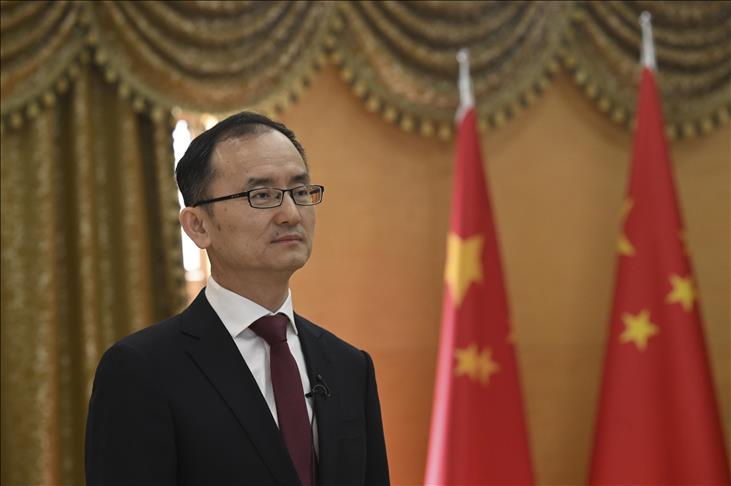China’s Ambassador to Türkiye, Jiang Xuebin, stated that China firmly opposes U.S. President Donald Trump’s decision tariffs on Chinese goods, emphasizing that Beijing will take countermeasures to protect its rights and interests.
‘Pressure, coercion, or threats are not the right way to build relations with China,’ he told Anadolu during an interview commenting on the U.S. tariff decision and recent developments in Türkiye-China relations.
Recalling that the U.S. has repeatedly imposed additional customs duties on goods imported from China, Jiang said, ‘China is decisively opposed to this and will take countermeasures to safeguard its rights and interests. Tariff wars and trade wars contradict historical trends and economic principles, and there will be no winners. Pressure, coercion, or threats are not the right way to establish relations with China.’
He urged the U.S. to cancel its unilateral tariff measures and resolve disputes with trade partners through equal dialogue.
According to a decree signed by the U.S. President Donald Trump on Wednesday, an additional 34% tariff is planned on top of previously announced taxes on Chinese goods. Combined with a 20% tariff introduced earlier this year, the total tax on Chinese products is expected to reach 54%. The tariffs are set to take effect in two phases on April 5 and April 9.

– ‘China Firmly Supports Türkiye’s Sovereignty and Interests’
On Türkiye-China relations, Ambassador Jiang said, ‘China steadfastly supports Türkiye’s pursuit of an independent and sovereign development path, as well as its efforts to protect its sovereignty, security, and development interests.’
He expressed appreciation for Türkiye’s understanding and support regarding China’s core interests, such as sovereignty, security, and territorial integrity, adding, ‘Both sides should continue to provide resolute mutual support and further strengthen the political foundation of bilateral relations.’
Highlighting the need to deepen practical cooperation, Jiang noted that the two countries have engaged in in-depth discussions to align China’s Belt and Road Initiative with Türkiye’s Middle Corridor project. He pointed out that bilateral trade volume reached $48.3 billion last year, making China Türkiye’s second-largest trading partner.

Jiang emphasized the importance of leveraging mechanisms like the China-Türkiye Intergovernmental Cooperation Committee to align development strategies, expand cooperation areas, explore new opportunities, and elevate mutually beneficial collaboration. ‘Cooperation in multilateral affairs must be strengthened,’ he said, adding that as key members of emerging markets and the G20, China and Türkiye share common or similar views on many international and regional issues.
He called for enhanced strategic communication, deeper coordination in platforms like the UN, and joint efforts to ensure the stability of global industrial and supply chains while promoting a fair and rational global governance system.
– ‘Accelerating talks on Türkiye’s third nuclear power plant project’
Describing Türkiye as a critical junction with its free-market system, advanced infrastructure, and unique geographic position linking Europe and Asia, Jiang said, ‘Türkiye’s economy maintains a growth trend, developing at a pace above the global average. With inflation easing recently, its economy has become more stable, attracting growing numbers of Chinese investors.’
In the energy sector, he highlighted the rapid progress in bilateral cooperation, noting that core sections of the Tuzgölü Underground Natural Gas Storage Expansion Project, undertaken by a Chinese firm, have been completed.
On Türkiye’s planned third nuclear power plant in Thrace, Jiang said, ‘Both sides are currently accelerating negotiations on Türkiye’s third nuclear power plant project. We encourage and support Chinese companies’ participation in Türkiye’s energy projects to contribute to its energy transition and green development, and we hope the Turkish side will create a fairer and friendlier business environment for Chinese firms.’
Türkiye aims to significantly expand its nuclear energy capacity by 2035, targeting 20,000 MW through both large-scale plants and small modular reactors (SMRs). The first plant is currently under construction in Akkuyu, Mersin.
According to the Turkish government’s plan, the second plant will be built in Sinop, with discussions of possible collaboration ongoing between Turkey, South Korea , and Russia. Meanwhile, a third plant, planned for Thrace, is under negotiation with China.
The country is also considering the integration of small modular reactors (SMRs) into its energy system. At the Akkuyu NPP, the first test electricity generation from Unit 1 is expected to begin this year, marking a major milestone in Turkey’s nuclear energy program.

